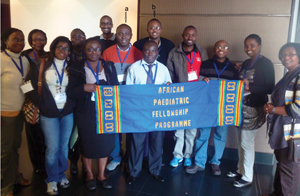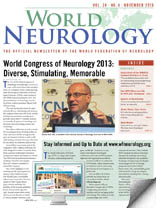
The 2013 intake of doctors training under the APFP program. Roland Ibekwe from Nigeria (a) and Edward Kija from Tanzania (b) are the current child neurology trainees. Other members of the group are training in diverse paediatric specialities from gastroenteritis to paediatric intensive care from many different countries in Africa including Uganda, Kenya, Zambia and Malawi.
By Jo Wilmshurst
The World Health Organization recommends a minimum of one adult neurologist per 100,000 of the population. The same group also reports that 10 percent of the pediatric population suffers from some form of neurodisability.
In Africa, the number of adult neurologists is significantly below this figure, and child neurologists are an even more scarce resource, with either no trained specialists, or at most one to service an entire country.1
The African Pediatric Fellowship Program is a project developed by the University of Cape Town to build skills capacity of health practitioners from Africa. Tertiary centers across Africa are assisted to develop strategic plans based on their countries’ key health care needs. Collaborating centers recruit teams to build skills and resources. Structured training occurs at the pediatric units through the University of Cape Town.
More than 55 specialists have completed the training program in diverse pediatric areas with a 98-percent retention rate of returning to work in their home countries since 2008. The program is evolving with training arms that support nursing and ancillary services.
Referring centers are encouraged to develop their own training modules as their trainees return, as such creating further training nodes across the continent. The trainee becomes the trainer in his or her home center, and a key opinion leader equipped to lobby for changes to health care policy.
The WFN provided a grant to support the program in 2011 over two years. Focused training has or is being provided to six general pediatricians from different centers in Nigeria, who manage large case loads of children with neurodisability and often epilepsy.
A key area of need identified by these doctors is the challenge of providing good care for children with epilepsy — centers lack the ability to perform and interpret EEG effectively and are not skilled in the clinical management of children with epilepsy.2 The University of Cape Town is in the process of developing a post-graduate diploma in “Pediatric Electrophysiology Interpretation and the Management of Children with Epilepsy.” This requires one-on-one training with a focus on areas relevant to the African context. The course should be available early in 2015.
Three doctors have been identified from Nigeria, Tanzania and Ghana, who at the request of their tertiary centers, are commencing formal training to be accredited child neurologists. Currently, Nigeria has 17 doctors with an interest in child neurology. (They are general pediatricians managing large numbers of children with neurological disorders.) Tanzania has no accredited child neurologists, and Ghana has two. Another trainee from Sierra Leone, which lacks both pediatricians (approximately eight in the entire country) and child neurologists (none), has been identified to train initially in general pediatrics and then to follow with developing relevant child neurology skills. This doctor started his pediatric training initially in Malawi in March 2013 at the Queen Elizabeth’s Children’s Hospital in Blantyre — a center with an exceptional general pediatric curriculum. After two years, he will transfer to complete his training in South Africa in our center. This system of developing other training nodes across the continent is the logical course to follow as it will build capacity to train more specialists. A goal of prevention and early intervention is one of the major aims for this project.
As such, the training is being developed to ensure that trainees return equipped with the concept of addressing health needs across all levels of health care. (They complete a “Transition and Translation of Knowledge module.”) They are expected to look at protocols, approaches and capacity to deliver health care from the primary health care clinics through to tertiary. While one person cannot address all of these needs, they can assist in the development of teaching programs whereby they train health care workers in safe and effective practice.
Building teams is essential. The program has a separate arm that focuses on nursing training, and the latest direction (the “third arm”) will be to develop ancillary services (namely physiotherapy, occupational therapy, speech therapy and so on). The benefits from these collaborations cannot be underestimated — there is much to learn from the approaches many innovative African centers undertake to cope with the challenges of scarce resources. The clinical skills of these doctors are exceptional as this and history taking are often all they have access to.
References
1. Wilmshurst JM, Badoe E, Wammanda RD, Mallewa M, Kakooza-Mwesige A, Venter A, Newton CR. Child neurology services in Africa. J Child Neurol. 2011 Dec;26(12):1555-63.
2. Wilmshurst JM, Cross JH, Newton C, Kakooza AM, Wammanda RD, Mallewa M, Samia P, Venter A, Hirtz D, Chugani H. Children With Epilepsy in Africa: Recommendations From the International Child Neurology Association/African Child Neurology Association Workshop. J Child Neurol. 2013;28 633-644
